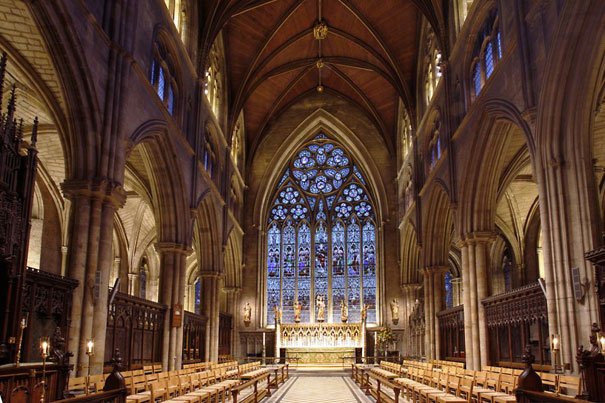Source Four PARs light England's famed Ripon Cathedral
Date Posted: 2/10/2014

80 ETC Source Four® PAR lighting fixtures have been used in the award-winning refurbishment of the historic Ripon Cathedral in North Yorkshire, England.
Lighting consultant Light & Design Associates (L&DA) won the Lighting Design Award 2010 in the 'Heritage Projects' category for the project, which consisted of a complete rewiring and new electrical installation.
Jim Morse, then a director at L&DA and now a consultant with them, was the lighting designer on the project. "The cathedral knew it needed new lighting both internally and externally," says Morse, "so it took the opportunity to upgrade to the latest and best technology. We used two types of Source Four PARs: 575W with wide-beam lenses for days when the cathedral is open for services and concerts, and Source Four PAR HID 150W for days when it is open to the general public. That way, they would have the quality they needed while keeping energy costs down."
The 575W lamps in the tungsten Source Four PARs are the 2,000-hour long-life versions, while the HID version has a standard life of some 12,000 hours, helping the cathedral save money by reducing the frequency of lamp changes.
"I specified Source Fours because they are a truly robust product and come in a range of beam widths. I had previously used a similar lighting scheme for Salisbury Cathedral in Wiltshire, where they had performed well. In both cases, we use them to highlight features of the cathedral, including the nave, the cross and the altar."
"While the tungsten 575W lamps use more energy at full brightness, they have the advantage that they can be dimmed as required. The cathedral also has the option to have both the metal-halide and tungsten luminaires on for very high light levels for filming and TV purposes."
The judges of the Lighting Design Award described the project as having "sophistication and precision."
Ripon Cathedral had been awarded over £500,000 (almost $800,000) by Britain's Heritage Lottery Fund (HLF) to relight the building's historic medieval detail and beauty and to enhance the visitor experience. The project manager was Patrick Crawford of Caroe & Partners Architects.